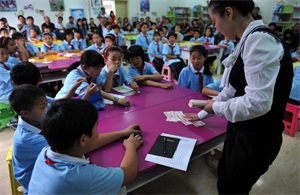Authorities need to get tough on fakes as Alibaba faces complaints
(China Daily) Updated: 2016-05-17 07:31
 |
|
Alibaba Group Holding Ltd founder Jack Ma arrives at the New York Stock Exchange for his company's initial public offering (IPO) under the ticker "BABA" in New York Sept 19, 2014. [Photo / Agencies] |
The International Anti-counterfeiting Coalition, the global organization on fighting counterfeit goods, recently announced that it had suspended the membership of Alibaba Group after complaints by some US and European brands. Beijing Youth Daily comments:
Reports show that fake goods are a problem around the world, not only in China. The annual trade volume of counterfeits was almost $461 billion, or 2.5 percent of the global total trade in 2013.
Then why close the door on Alibaba?
There are several reasons for this. The first is Western countries' prejudice against China. The European Parliament recently passed a non-binding decision not to recognize China's market economy status. On topics such as market economy status, intellectual property rights protection, and anti-dumping, these Western countries discriminate against China and refuse to work with Chinese enterprises.
Besides, Alibaba and the Western companies hold different views on how to fight fake goods. Alibaba only forbids goods that prove fake, while Western luxury brands insist that all sales channels beside their own should be cut. It is hard to find a compromise between the two.
Third, it is improper to impose the duty of fighting counterfeiting onto the e-commerce platforms only. They only provide a sales channel and are not the producers and sellers of fake goods. The whole society should be responsible for the rampancy of fake goods and no one can afford to neglect that. The consumers, law enforcers, and the whole market need to think about it, not only a Chinese enterprise.
This is not to deny there are many fake goods sold on Taobao.com, which is run by Alibaba, and there is much for Chinese e-commerce to do to root out counterfeit goods.
Authorities used to issue a guiding document that promised to effectively curb IPR violations in e-commerce in China. It is time for them to do better so that Chinese enterprises get more respect.
- China to intensify crackdown on IPR infringement, fake goods
- Global trade in fake goods worth nearly $500b: Study
- Retailers and officers must join forces to target fake goods
- Guangdong rolls out new smart technology to catch fake goods
- Fake goods hurt e-retail
- Targeting fake goods for profits
- Fake goods seller sentenced
- Alibaba: SEC seeking information on fight over fake goods
- Quality watchdog to check online shopping platforms for fake goods

I’ve lived in China for quite a considerable time including my graduate school years, travelled and worked in a few cities and still choose my destination taking into consideration the density of smog or PM2.5 particulate matter in the region.











